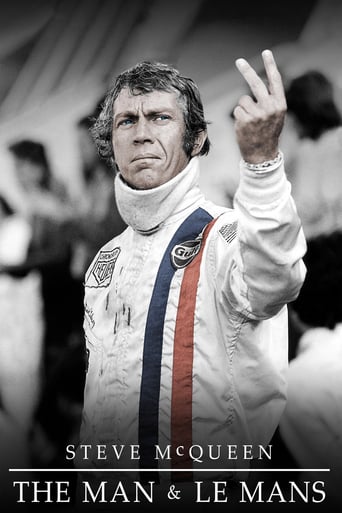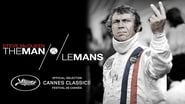Scarecrow-88
"Le Mans" came at a time when McQueen's career couldn't be higher. He was dying to make a motor racing picture but arriving for the Le Mans, Frankenheimmer was making "Grand Prix" with James Garner. Undeterred McQueen worked elsewhere but no reasonable script, long production woes, race car disasters, his own conflicts with directors, and budget problems caused a great deal of angst and anxiety, as the star actor saw writers, studio execs, and directors at odds with his vision. McQueen didn't want a romantic or melodramatic plot to get in the way of his passion, so a script built around what he wanted fell by the wayside. Included are audio thoughts and recollections from the man himself, details by racecar drivers, his ex wife, those involved in the film, and his son which coincides with behind the scenes footage of "Le Mans" making for quite an extraordinary experience if you are fascinated with McQueen. His cheating with other women, including wrecking the car while out with an actress starring in "Le Mans", his being on Manson's death list (he was supposed to be at the Sharon Tate home as buddy Jay Sebring asked him to come by the night of the Tate-Lobianco murders!), letters typed and signature signed by him read aloud during key moments in the doc, and the loving portrait of racing and how he tried to beautify it make this a must-see. Only problem: some of McQueen's captioned words and the explanation of chapters for the film are way too small.
calvinnme
This documentary presents, through the use of a few recently discovered audio tapes, the man himself speaking, and through both present day and period filmed first-person accounts of many others involved with the making of the 1971 commercial failure of an auto racing film, how the actor would find his - at the time - skyrocketing Hollywood career taking a momentary nosedive due to his single-minded passion to produce a motor sports movie sans the usual "personal/love interest" backstories to be found within most all of this sort of film genre. In other words, just a movie featuring McQueen's "love interest"...auto racing.It also includes many filmed recollections of his first wife, entertainer Neile Adams, and their son Chad McQueen, and thus also attempts to bring the actor's personal and family life into focus at a time in which the marriage was coming to an end due to McQueen's persistent philandering and a seeming sense of his own personal career hubris.This is probably going to be best enjoyed by fans of McQueen and/or auto racing and/or those interested in documentaries showcasing the business of film-making. I'm interested in the business of filmmaking and the careers and lives of the stars, and my opinion afterwards was that "The King of Cool" could be, under stress, very difficult, just like any of us can be. Also be warned that the language used gets pretty salty.
Rafi Jaan
Why would a documentary about a racing film and an actor need to be rated TV-MA? I'm not in favor of censorship, but what's the need to use so much profanity in a movie that's essentially (or is supposed to be) about a great actor who loved cars and made one of the greatest racing movies of all time?! He wasn't a gangster or a mobster and when the movie itself, Le Mans, is made for everyone, why then is a documentary about the subject rated for mature audience only? Maybe I'm dwelling too much on this but that alone tells me that the filmmakers here didn't understand Le Mans or the man behind it, and apparently didn't want everyone to see this film. Also, just as others have already pointed out, the intro to the movie is so slow and boring, without a need to be so, with very tiny texts that, I suppose, are supposed to be stylish but are not. Too bad because I was not only looking forward to this movie, but also wanted to introduce my younger brother to the man that made Le Mans, through this movie. This movie is not worth it. One would be better off watching the actual movie, Le Mans, again.
Larry Silverstein
Unfortunately, this documentary came across to me as disjointed, somewhat tedious, and had some annoying technical issues. For example, one technical issue was the lettering showing who the interviewees were on screen, plus the wording for background information on the film, were extremely small, forcing me to constantly use my remote zoom, which can get quite annoying. Another issue was that the subtitles, at times, didn't match what was being said on the screen.The documentary centers on the extremely troubled movie production of "Le Mans", in 1970, with production led by superstar Steve McQueen, He had a tremendous passion for racing, and had just finished second in the 12 Hour Sebring Race, with driving partner Peter Revson.McQueen wanted 'Le Mans" to be his "piece de resistance", where he would pour his heart and soul into the making of the movie, which would combine actual footage of the 24 Hour Le Mans Race with sequences shot away from the race, but using real race drivers,However, the making of the film was plagued by numerous problems, which included tragic accidents, lack of a script of any kind, ego clashes with some of McQueen's former collaborators including director John Sturges and writer Alan Trustman, McQueen's numerous on-set affairs which would eventually lead to the end of his first marriage to Neile Adams, and high budget production overruns.All of this would result in McQueen's production partners Cinema Center Films taking control of the set and forcing McQueen to take an acting role only. Eventually, the movie would be released in 1971, to mixed reviews from pro critics with some calling it poetic while others were not so kind. From what I could garner, the film did poorly at the box office, but has now become somewhat of a cult classic.The documentary is directed by Gabriel Clarke and John McKenna, and to note, for those that are sensitive to such, it does contain explicit language laced throughout the film.Overall, I thought the movie was somewhat interesting, despite its technical and editing problems. Although the film certainly implies that McQueen's ego and intransigence were the main culprits, the effect on McQueen was profound when his "passion project" was pulled from his control, as he abandoned his interest in racing and per his first wife Neile "saw the world in a different color" thereafter. McQueen would die in 1980, at the age of 50, from a rare form of lung cancer, asbestos poisoning,with asbestos later found in the racing suits of drivers in his era.






